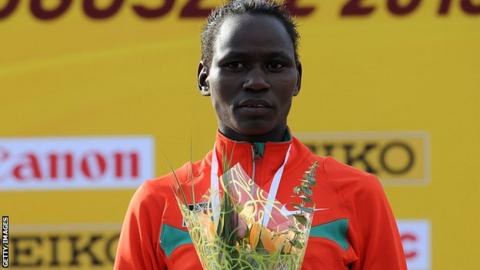
Kenya has been declared in breach of global anti-doping rules.
The surprise move will mean some of the world’s top athletes are at risk of missing August’s Olympic Games in Rio.
Kenya, one of the major forces in world athletics, has already missed two World Anti-Doping Agency (Wada) deadlines to show it is tackling cheating in sport.
Wada’s compliance committee ruled the country “non-compliant” when its board met in Montreal on Thursday, citing issues with anti-doping legislation.
The recommendation needs to be ratified by the Wada board.
After a series of drugs and corruption scandals, Kenya had been warned to comply with Wada’s rules or face sanctions.
Last month, it finally passed legislation that created a new national anti-doping agency, with President Uhuru Kenyatta personally driving the new law through.
It was widely assumed that the measure would satisfy Wada.
David Were, chair of the Kenya parliament sports and welfare committee which developed the anti-doping bill, said Kenya will appeal the decision.
Were told the BBC he was “shocked” by the decision, adding “we have met all the requirements” and claiming the bill’s proposals were “stringent enough”.
It will now be up to the International Olympic Committee (IOC) to decide whether to ban Kenyan athletes from the Rio Games or any other competitions.
They could come under pressure to do so, amid an unprecedented doping crisis and mounting concern over the country’s lack of action against cheating.
The Olympic participation of another powerhouse athletics nation – Russia – is already in doubt.
In November, the International Association of Athletics Federations (IAAF) banned the country’s track and field athletes from international competition following allegations of systemic state-sponsored cheating.
The IAAF, which governs world athletics, will decide on Russia’s possible reinstatement in Vienna on 17 June.
Kenya is dominant at distance running, winning 11 medals at London 2012 and topping the table at the World Championships in Beijing last year with seven golds.
But the country has become mired in doping and bribery allegations, with more than 40 of its athletes failing drugs tests since 2011.
In November, former Wada president Dick Pound said it was “pretty clear that there are a lot of performance-enhancing drugs being used” in Kenya.
How did it come to this?
In February, the BBC revealed Kenya had missed a deadline to pass a law establishing a new national anti-doping agency so that more testing could take place.
Wada placed it on a ‘watch-list’ of nations at risk of breaching its code and gave it until 5 April to comply, with IAAF president Lord Coe threatening Kenya with a ban if it did not pass the bill into law.
Kenya missed that second deadline, too, but was then given until 12 May to make its national agency operational.
Last month, Kenya finally passed the crucial legislation.
In fact, it went further than Wada had requested by criminalising doping and threatening cheats with prison sentences.
At the time, President Kenyatta said he was confident Wada would “look upon the passage of our anti-doping law favourably”.
That view was echoed by some of Kenya’s top athletes, who feared they might be thrown out of the Rio Olympics if the law was not passed.
“That’s what Wada was waiting for in Kenya, so we are safe,” London Marathon champion Eliud Kipchoge said.
However, it is understood Wada officials are not happy they were not informed of certain key amendments to the legislation.
What will the decision mean?
Declaring Kenya non-compliant will be seen as a sign that the organisation is finally getting tough with countries that flout their rules.
In the last few weeks, it has suspended national anti-doping laboratories in Moscow, Beijing, Lisbon and Bloemfontein, raising serious concerns about the effectiveness of drugs-testing in the build-up to Rio.
This week, Wada also opened an investigation into allegations of Russian doping at the Sochi 2014 Olympics.
Any other problems for Kenya?
The IAAF has suspended Isaac Mwangi, chief executive of Athletics Kenya following allegations he requested a bribe to reduce the doping suspensions of two athletes.
Three other senior officials at Athletics Kenya have also been suspended following accusations they were involved in corruption linked to Doha’s successful bid for the 2019 World Championships.
All four officials and the Qatar campaign team deny any wrongdoing.



